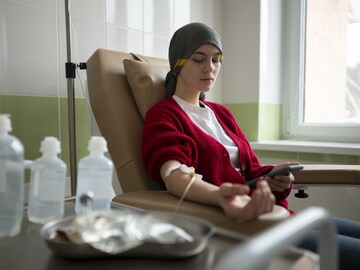Chemotherapy is a widely used cancer treatment that involves powerful drugs to target and destroy cancer cells in the body. It plays a crucial role in cancer care, often combined with surgery or radiation therapy for optimal results. While chemotherapy is highly effective, it can also cause significant side effects. As the drugs attack both cancerous and healthy cells, patients may experience physical and emotional challenges, including hair loss, fatigue, nausea, infections, anxiety and depression.
Therefore, prioritising your health and well-being after chemotherapy is vital. The recovery process will allow you to regain strength, heal, and embark on a new chapter of life.
In this article, let’s check out the dos and don’ts to follow after the chemo sessions:
- Eat a healthy diet: Chemotherapy impacts the body’s ability to absorb and use nutrients from food. So, eating a healthy diet is especially important to support the immune system and promote healing. After the chemotherapy treatment, focus on incorporating plenty of fruits and vegetables, whole grains, lean proteins and healthy fats into your diet. Moreover, avoid consuming processed foods, sugary drinks and excessive amounts of alcohol.
- Stay hydrated:Drinking plenty of water and electrolyte-rich beverages throughout the day is another essential thing to follow. Water helps to promote healthy digestion and flush toxins out of the body. Focus on drinking at least eight glasses of water each day for one week after treatment. Increase the intake of water if you are experiencing excessive sweating or diarrhoea.
- Get Enough Rest: Fatigue and exhaustion are the most common effects experienced by cancer patients, especially after chemotherapy. It is important to have at least 7-8 hours of good night’s sleep every day. Avoid using electronic devices and watching TV, and create a relaxing environment by keeping the bedroom cool, dark and quiet. Short naps during the day can also be beneficial to reduce fatigue and improve energy levels.
- Practise good hygiene: Chemotherapy treatment weakens immunity, leaving the body vulnerable to infections. Therefore, it is important to take preventive measures to minimise the risks. This includes taking good care of your mouth, as chemotherapy causes dry mouth or sores, leading to an increase in bacteria in your mouth. Moreover, wash your hands frequently with soap and water, especially before eating and after using the restroom. Finally, avoid touching your face, nose or mouth, as this can transfer germs from your hands.
- Stress reduction techniques: Chemotherapy can be a stressful time that can affect both physical and emotional health, so it’s crucial to find ways to manage it post the treatment. You can try meditation or deep breathing to calm the body. Practising yoga can also be helpful to improve flexibility, strength, and balance while reducing stress and anxiety, or regularly exercise to reduce stress, improve mood, and boost energy levels. If you don’t like to do this, you can try activities such as painting, writing, or playing music to help promote relaxation.
Follow-up appointments:
It is important to have follow-up appointments with your oncologist and primary care physician to monitor health, track progress, and address any concerns or issues. Additionally, consider having a physical examination, lab tests, imaging tests, or other diagnostic procedures to help catch any issues before they become serious. You can also consult your doctor and take supplements like probiotics, vitamin D, etc. to support immune function and overall health.
Other than this, there are several important “don’ts” to keep in mind during post-chemo recovery.
- Self-care: Don’t neglect self-care and healthy habits. Chemotherapy can weaken the body and immune system, so avoiding healthy habits can cause physical and emotional health issues from lack of sleep or difficulty regaining strength and stamina due to poor nutrition, and hydration.
- Smoking: During this time, you should also quit smoking and tobacco use, as chemicals in tobacco products weaken the immune system, increasing the risk of infections and chronic health conditions.
- Isolation: Patients often isolate themselves from their loved ones due to guilt. Cancer treatments are challenging, but staying connected to family and friends is essential for speedy recovery. Isolation may lead to loneliness, anxiety, and depression, while social support can offer emotional support, advice, and encouragement to cope with the challenges.


